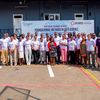Tutoring the Foundational Methods in Data Science Training School in Kigali, Rwanda

Tutoring the Foundational Methods in Data Science Training School in Kigali, Rwanda
In March 2024, I had the great opportunity to attend the Doctoral Training School - Foundational Methods in Data Science Training School in Kigali as a tutor. The school was organized by the AIMS Research and Innovation Center.
The training school, funded by Carnegie Cooperation of New York and the Government of Rwanda, is highly interactive and brings together renowned international and national experts, academics, researchers, and graduate students, working on topics relevant to modern data science, including, data science, machine learning, and artificial intelligence, their mathematical theories and numerical implementations, using methods from statistics, optimization, functional analysis, numerical analysis, and linear algebra, with a focus on practicals and hands-on problem-solving sessions.
The training school provides a platform for researchers, data scientists, and new Ph.D. students, to interact in an interdisciplinary and transdisciplinary environment.
For the Machine Learning Essentials course in particular, participants had the opportunity to work on various real-world projects namely; Fine-tuning - Large Language Models, Deep Learning for Malaria Diagnosis, and air quality forecasting from Time Series.
Overall, it was a great experience to meet and learn from various researchers, present my work, and share my experiences with new PhD students.
Share article
Author
Kerol Djoumessi
 Kerol Djoumessi is a PhD student in the Department of Data Science at the Hertie Institute for AI in Brain Health at the University of Tübingen and an IMPRS-IS scholar. In the past, he has studied several topics including software design and dynamic resource allocation in virtual networks. His current focus is on the design of interpretable/explanable deep learning models for clinical diagnosis, particularly inherently interpretable models for medical image analysis with applications in ophthalmology. In addition to interpretability, he is interested in clinical ethics, resource-efficient deep learning models, and the deployment of deep learning models.
Kerol Djoumessi is a PhD student in the Department of Data Science at the Hertie Institute for AI in Brain Health at the University of Tübingen and an IMPRS-IS scholar. In the past, he has studied several topics including software design and dynamic resource allocation in virtual networks. His current focus is on the design of interpretable/explanable deep learning models for clinical diagnosis, particularly inherently interpretable models for medical image analysis with applications in ophthalmology. In addition to interpretability, he is interested in clinical ethics, resource-efficient deep learning models, and the deployment of deep learning models.
